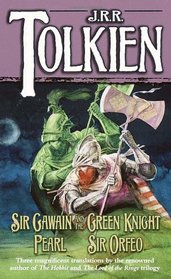Helpful Score: 3
This slim volume, put together by Christopher Tolkien, collects three translations done by J.R.R. of 14th-century British poems, together with writings by Tolkien Sr. on the poetry.
'Gawain and the Green Knight' is the classic, and not surprisingly, the best. Originally written in an alliterative style, Tolkien reflects that style in his translation, but the verse-form is such that it is not distracting to the story - it's very readable.
The story is, of course, that of one of Arthur's knights who agrees to a (rather foolish contest) with a strange, fey knight of mysterious powers. Bound by his word to seek out the knight (and, undoubtedly, his own death) the next year, he wanders in search of the knight and his appointed meeting - but encounters the hospitality of a merry lord and his all-too-seductive wife....
'Pearl' didn't do it for me, I have to admit. The narrator encounters the ghost of his dead daughter, who tells him, at great length, about how the dead are with god and the living have to accept it, blah blah blah religious dogma blah blah.
'Sir Orfeo,' however, is a very interesting poem, especially considering how old it is. It's a very intentional 'updating' of the legend of Orpheus and Eurydice, making the characters a British lady, and her lord, who seeks her when she has been taken under the hill by Faerie. Pretty cool that we can see that in the 14th century, people were adapting stories to their own mythologies (as they've always done, of course).
'Gawain and the Green Knight' is the classic, and not surprisingly, the best. Originally written in an alliterative style, Tolkien reflects that style in his translation, but the verse-form is such that it is not distracting to the story - it's very readable.
The story is, of course, that of one of Arthur's knights who agrees to a (rather foolish contest) with a strange, fey knight of mysterious powers. Bound by his word to seek out the knight (and, undoubtedly, his own death) the next year, he wanders in search of the knight and his appointed meeting - but encounters the hospitality of a merry lord and his all-too-seductive wife....
'Pearl' didn't do it for me, I have to admit. The narrator encounters the ghost of his dead daughter, who tells him, at great length, about how the dead are with god and the living have to accept it, blah blah blah religious dogma blah blah.
'Sir Orfeo,' however, is a very interesting poem, especially considering how old it is. It's a very intentional 'updating' of the legend of Orpheus and Eurydice, making the characters a British lady, and her lord, who seeks her when she has been taken under the hill by Faerie. Pretty cool that we can see that in the 14th century, people were adapting stories to their own mythologies (as they've always done, of course).




